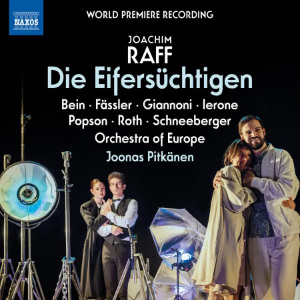
Joachim Raff (1822-1882)
Die Eifersüchtigen (1882, world premiere in 2022)
Matthias Bein (baritone) – Beppino
Mirjam Fässler(soprano) – Ninetta
Serafina Giannoni (Soprano) – Donna Rosa
Raisa Ierone (mezzo) – Donna Bianca
Benjamin Popson (tenor) – Don Claudio
Martin Roth (bass) – Don Geronimo
Balduin Schneeberger (baritone) – Don Guilio
Orchestra of Europe/Jonas Pitkänen
rec. 2022, Theater im Seefield, Zurich, Switzerland
Booklet with notes in German and English; Full German libretto is available to download.
Naxos 8.660561-62 [2 CDs: 138]
In 2024 the reputation of Swiss composer Joachim Raff as an opera composer has suddenly been resurrected because of two recordings that were made during the birth bicentenary activities which occurred in his native Switzerland. First his large scale opera Samson (review), and now we have this opera which was composed during the months prior his death. Joachim Raff was a mid-19th century composer who had the good fortune to work with Franz Liszt on the world premiere of Wagner’s Lohengrin in Weimar in 1850. Raff seems to have been profoundly affected by his experience with Wagner’s great music drama. He wrote a treatise about Wagner’s opera in which he both celebrated its composition but also listed numerous areas where he felt Wagner had gone wrong. The composer later turned his back on the Wagnerian style, especially for this, his final opera. The plot and characters all look back to 18th Century Opera Buffa. Despite the love and care that he lavished on this work Die Eifersüchtigen (The Jealous One’s) did not manage to achieve any performances until its world premiere in Zurich in 2022, of which this recording is the result.
Stendahl once wrote “Who, unless it were a French critic, would dream of judging an opera by the words?” Looking at the libretto for Die Eifersüchtigen one wonders why Raff bothered to write it at all. It is a slight and silly affair which harkens back to the opera buffa territory of Cimarosa and Salieri. Yet Raff has lavished his considerable creative talents on this creaky frivolity by giving it music of such creativity and luscious harmony as to defy belief. The music of Die Eifersüchtigen is melodic and inventive; it is infused with gentle humour and engaging characterizations of the various characters. More than once I was reminded of von Flotow’s Martha or von Suppe’s Boccaccio; two works that have only just managed to keep a toehold in the repertoire of European opera houses over the last 150 years. While Die Eifersüchtigen isn’t going to alter anyone’s world musically or dramatically speaking, it proves to be worth trotting out on an occasional basis for the true musical pleasures it contains. There are several quite lovely solo arias liberally scattered throughout the opera’s nearly two and a half hours. One of the most delightful numbers is the delectable quartet that closes the Second Act, which is sung while the principals are all enjoying a rather confusing picnic beside Venice’s Grand Canal. It left me musing on whether that activity is even possible, not to mention wise.
The Naxos recording which was made around the time of the premiere in Zurich does not indicate if it was made live (neither does it indicate that these performances were the work’s world preiere). I could detect no signs that is has been recorded with an audience present. Likely it was recorded in tandem with the staged performances. The cast here is made up of young singers who give their heart and souls to this music. The cast doesn’t always exhibit the polished sheen of more established singers in their vocal portrayals but they give committed and enthusiastic characterizations of what are mostly stock comic figures.
Matthias Bein is a most appealing Beppino (the obligatory frustrated servant). His baritone is not large but it does have tenor-ish qualities which feature beautifully in the sweetly-sung romance with which he opens the Second Act. Balduin Schneeberger trenchant soft-grained vocal quality is a real asset and he sings captivatingly with an elegant sense of line. He also conveys the aristocratic nature of Don Guilio quite satisfactorily.
Raisa Ierone’s Bianca shows the singer is in possession of an attractively sensual-sounding mezzo. Her top range has a loosely floating quality which is reminiscent of the great Gundula Janowitz, although occasionally Ierone’s voice can lose its fullness in that same upper region. Serafina Giannoni is bright-toned and flexible as Donna Rosa but sometimes she comes across as brittle-sounding. The smoky-toned mezzo of Mirjam Fässler is a success as Ninetta. Raff gives her the gift of a delightfully comic lamentation aria which Fässler judges beautifully as to how far to push the satire of the piece.
Finnish conductor Jonas Pitkänen gives a fine performance of this delicately gleeful work. His tempi are rhythmically alert and he propels the music forward constantly without ever getting bogged down in excessive underlining. The small orchestra gives a decent account of themselves under his leadership. The recording is closely immediate in its intimate acoustic, yet there is a strange, overly noticeable reverberation coming from the auditorium. It was off-putting at first but the ear quickly adjusts to it and it doesn’t seriously mar enjoyment of this lovely work in any way.
Die Eifersüchtigen turns out to be a beautifully conceived look back at opera buffa from the late romantic era. It has enough musical invention to make it worth hearing, even if it must be relegated to the ranks of operas like Weber’s Oberon, in which the musical inspiration miraculously exceeds the drama on which it was founded.
Mike Parr
Buying this recording via a link below generates revenue for MWI, which helps the site remain free




















